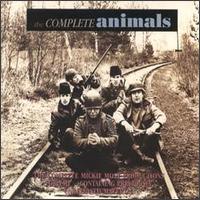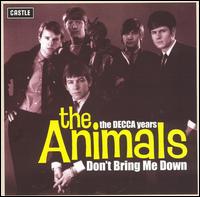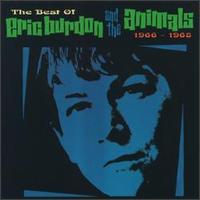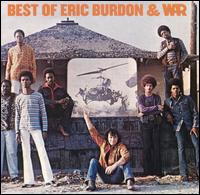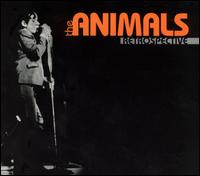Randy's Rodeo
music that rocks, rolls, swings, and twangs
| Artist Index | Song Index | Radio | Home |
|
Music Reviews Special Features Information Support Me |
Sock it to me, Santa!
Animals singer Eric Burdon evinced an uncanny empathy for the blues, and his disarmingly earnest, plebeian anger elevated the bands' ballads of disenfranchisement (very few of which they actually wrote) to anthemic heights. "House Of The Rising Sun," "Don't Let Me Be Misunderstood," "We Gotta Get Out Of This Place," and "It's My Life" are as good as anything the British Invasion yielded during that bountiful season. These were potent songs, powerful enough to inspire rockers as varied as Bruce Springsteen, David Johansen, Elvis Costello, Joe Cocker, Santa Esmerelda, Omar & The Howlers, and the Partridge Family (!) to cover them in years hence. The Animals' early records were produced exclusively by pop auteur Mickie Most and consisted mainly of R&B covers, displaying a decided fondness for John Lee Hooker and Bo Diddley. They were really good covers, though, and the smattering of originals ("I'm Crying," "I'm Going To Change The World") bear witness to the rapidly developing songwriting talent of Burdon and bandmate Alan Price. These sessions produced two British albums - The Animals (1964) and Animal Tracks (1965), both included on a 2004 UK CD - and a host of singles, all gloriously documented on the imported The Complete Animals (EMI, 1990), two discs of pristinely restored mono masters. [close]
Typical of the volatile 60's, though, the original Animals' days were numbered. Keyboardist Alan Price had gone solo after "It's My Life," meeting with immediate success on the British market with songs like Screamin' Jay Hawkins' "I Put A Spell On You" and Randy Newman's "Simon Smith And His Dancing Bear." His albums The Price To Play (1966) and A Price On His Head (1967) are valued by collectors, and Price would later make "concept" records like Between Yesterday And Today (1973) that appealed mainly to Anglophiles and rock critics. At the time, those critics considered Price's soundtrack to O Lucky Man! (a 1973 film) to be one of the best records ever made, but it is all but forgotten now. Alan Price's long, varied solo career is neatly summarized by Castle Music's Geordie Boy: The Anthology (2002). Meanwhile, Chas Chandler left after "Don't Bring Me Down" and went on to great distinction as a manager (his clients included the Animals) and producer. Most famously, he discovered Jimi Hendrix during his final tour with the Animals. Chandler brought him to England and was largely responsible for Hendrix's meteoric rise to stardom. Later, Chandler did much the same for British glam metal heroes Slade.
Soon, however, Eric Burdon fell under the spell of psychedelia, and by 1967 (i.e. the Summer Of Love) his music had degenerated into pretentious, hippie schtick. Had it not been so dreadfully sincere, it would have been hilarious. Don't get me wrong, "San Franciscan Nights," "Monterey," and "Sky Pilot" are charming in their own ham-handed way. Still, they are so dreadfully forced and self-conscious that one can envision poor Eric panhandling in Haight-Ashbury, willing to do anything to be accepted by the "beautiful people" he so breathlessly chronicled. The Animals' early hits were so natural and effortless in their working-class indignation and love of the blues. Those qualities were completely absent from Burdon's music by the end of the 60's. These years are adequately surveyed on Polygram's Best Of Eric Burdon And The Animals 1966-1968; the trippy tone of the album is leavened by gritty sides from the brief post-Mickey Most, pre-psychedelic era (e.g. "Don't Bring Me Down"). Burdon's late 60's work is worth hearing if only for the spectacle, but, in retrospect, his glory days had ended when the original Animals disbanded. It was passion, not discipline, that made Eric Burdon a great singer, and without a great band to keep him focused, he floundered.
Shortly after splitting with War, Eric Burdon recorded Guilty (1971) with blues singer Jimmy Witherspoon, but he didn't wax a formal solo record till 1974 when he released Ring Of Fire and Sun Secrets to near unanimous derision. In the decades since, Burdon has continued to record and tour, locked in an eternal game of hide-and-seek with his own mojo. The original Animals, meanwhile, reunited in 1977 for the universally acclaimed Before We Were So Rudely Interrupted, an impressive piece of oneupsmanship with the burgeoning punk movement. They returned in 1983 with Ark and a subsequent live album, Rip It To Shreds, that more than lived up to its name.
Eric Burdon and the Animals are long overdue for a retrospective (boxed set?) that could secure their place in rock history and put their all their wacky career highs and lows in the proper perspective. At the outset, the Animals were a great r'n'b outfit and a terrific singles band. But whereas the Beatles, the Stones, and the Who reveled in psychedelic chic, the Eric Burdon and the Animals were beaten mercilessly by it. Bravely, they persevered, valiantly endeavoring to stay relevant. In the end, I believe, they earned a spot among rock's royalty. Brilliance, though, is its own justification, and the Animals at the height of their powers were justified, indeed. Release Notes. As noted above, the original Animals released just three albums in Britain during the 1960's. Tracks from these albums were combined with a slew of non-LP singles and divided amongst five American albums (listed below). None of these albums has an English equivalent, despite some similarities in titles. A sixth album, Eric Is Here, was released only in the States, but all subsequent album releases were roughly synchronous on both side of the pond. [top of page]
Your witty comments, impertinent questions, helpful suggestions, and angry denials are altogether encouraged. Submit feedback via email; submissions will be edited and posted at my discretion. |
|
|||||||||
Navigation Artist Index Song Index Randy's Radio Home Top Of Page Music Reviews Alternative Blues Books Christmas Classic Rock Country Jazz Lounge Special Features History Of Randy's Rodeo Sex Pistols Motown Records Halloween Valentine's Day Information About Me Feedback Links User's Guide Support Me Amazon iTunes Sheet Music Plus © 1999-2025 Randall Anthony, www.hipchristmas.com and www.randysrodeo.com |
|||||||||||

